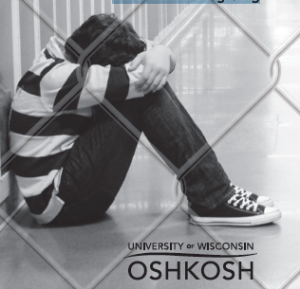News & Announcements
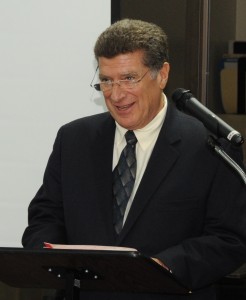 Here's a piece by IIRP president Ted Wachtel that appeared on University Business Magazine's web site:
Here's a piece by IIRP president Ted Wachtel that appeared on University Business Magazine's web site:
Campus residence hall advisors (RAs) have a tough job. But there is a tool that can make their work easier and more effective: restorative practices.
Most RAs sign on for the job because they want to help build community, provide guidance to their peers and learn what it means to be in a leadership role. RAs, however, also are charged with managing behavior. They are granted a certain amount of authority to enforce campus policies, rules and regulations.
 In this piece, "Less Prison, better prevention of crime," Australian criminologist John Braithwaite argues that the evidence shows in so many areas that restorative rather than punitive responses, and also evidence-based responses to preventing crime, provide a better return on government investment by reducing crime and serving the needs of victims.
In this piece, "Less Prison, better prevention of crime," Australian criminologist John Braithwaite argues that the evidence shows in so many areas that restorative rather than punitive responses, and also evidence-based responses to preventing crime, provide a better return on government investment by reducing crime and serving the needs of victims.
Braithwaite discusses prisons, policing, restorative justice, remorse, forgiveness, anti-bullying programs, fraudulent shifting of corporate profits to off shore tax havens and the US housing crisis in this terse and powerful article. Read it here.
John Braithwaite is an Australian Research Council Federation Fellow and Founder of RegNet (the Regulatory Institutions Network) at the Australian National University. He is embarking on a 20-year comparative project called 'Peacebuilding Compared', with Hilary Charlesworth, Valerie Braithwaite and Kate Macfarlane. He is also an honorary trustee of IIRP.
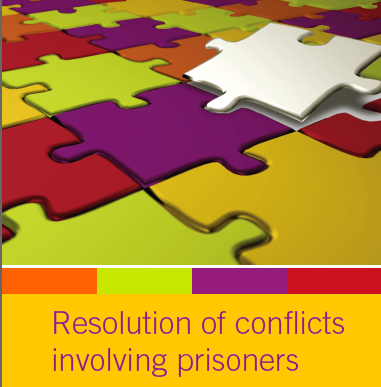 MEREPS – Mediation and Restorative Justice in Prison Settings – was a three-year project funded by the EU. According to the now freely available PDF Handbook on Using Restorative Justice in Prisons, "The primary objective of the MEREPS project is to identify ways to apply mediation and restorative practices in prison settings, with special regard to providing support to victims and enabling offenders to take responsibility. It also aims to facilitate the resolution of conflicts resulting from a crime between the victim and the offender, and the offender and their environment, including other inmates, with a view to facilitating the reintegration of offenders following their release."
MEREPS – Mediation and Restorative Justice in Prison Settings – was a three-year project funded by the EU. According to the now freely available PDF Handbook on Using Restorative Justice in Prisons, "The primary objective of the MEREPS project is to identify ways to apply mediation and restorative practices in prison settings, with special regard to providing support to victims and enabling offenders to take responsibility. It also aims to facilitate the resolution of conflicts resulting from a crime between the victim and the offender, and the offender and their environment, including other inmates, with a view to facilitating the reintegration of offenders following their release."
This project involved six research partners from four countries and had assistance from numerous practitioners in Hungary, where the project was focused. Vidia Negrea, director of IIRP affliliate Community Service Foundation (CSF) of Hungary, wrote to me about this project:
The project proved that restorative principles can be implemented in the day to day life of a prison by offering support to the staff in their work with prisoners and helping prisoners to learn new ways of dealing with their conflicts.
"Between January 17 and 19 in Budapest was the MEREPS projects’s final conference. This was the end of a 3-year international project with a pilot mediation project delivered in the Balassagyarmat Prison. Here the pilot project started with a three-days-long mediation course – Marian Liebmann was the trainer – some of the training elements are in the MEREPS Handbook.
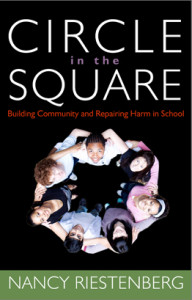 From Living Justice Press:
From Living Justice Press:
In this, her first book, Nancy Riestenberg writes warmly and with long experience about the challenges facing school communities and how restorative measures—specifically Circles—create a safer space for learning and development for all. Using stories direct “from the hallways,” she brings heart to subjects that are often divisive and controversial: bullying and other violence, suspension, drug use, staff conflicts, and more. Throughout the book, Nancy’s focus is on strategies that actually work for the whole school community: students, parents, administrators, teachers, and the community in which they live.
Click here to read reviews and order.
For a previous interview with Nancy Riestenberg, Prevention Specialist in the Minnesota Department of Education Safe and Healthy Learners unit, by Laura Mirsky in the Restorative Practices eForum, click here.
Here are two brief excerpts from an article by Sara K. Satullo that appeared last Friday, February 3 in the Easton Express-Times:
Bethlehem Area Social Studies teacher Joanne Widdersheim gathered 10th-graders in a circle Friday.
She tasked them with revisiting a question she posed to them at the start of the semester: Where do you want to be in 30 years?
Students had a few minutes to draft a Time magazine cover with a witty slogan. Widdersheim teased students, pressed them to work faster and knew when to lay off when a shy student needed more time. She also had them laughing hard.
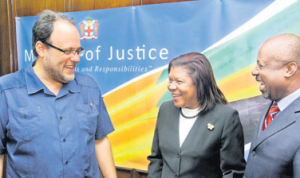 (From left) Justice Minister Mark Golding, Chief Justice Zaila McCalla, and Robert Rainford, permanent secretary in the Ministry of Justice, share a light moment prior to Thursday’s launch of Restorative Justice Week at the ministry in Kingston. (Photo: Lionel Rookwood)This week – February 5 through 11 – Jamaica once again celebrates Restorative Justice Week on the theme of "One People, One Spirit, One Justice." This is the 5th year Jamaica has hosted such a week of events related to restorative justice, and this year it coincides with Jamaica's celebration of its 50th year of independence.
(From left) Justice Minister Mark Golding, Chief Justice Zaila McCalla, and Robert Rainford, permanent secretary in the Ministry of Justice, share a light moment prior to Thursday’s launch of Restorative Justice Week at the ministry in Kingston. (Photo: Lionel Rookwood)This week – February 5 through 11 – Jamaica once again celebrates Restorative Justice Week on the theme of "One People, One Spirit, One Justice." This is the 5th year Jamaica has hosted such a week of events related to restorative justice, and this year it coincides with Jamaica's celebration of its 50th year of independence.
According to this article from the Jamaica Observer, Justice Minister Mark Golding said:
As it stands, “our justice system defines and treats crime as an offence against the State and its laws.” This definition, the minister pointed out, was geared at attributing blame and punishing the offender, not solving problems and restoring broken relationships. ...
 The Restorative Justice Council is hosting a one-day conference on March 29, 2012 in London on the topic "Making restorative practice accessible to all through meeting individual needs".
The Restorative Justice Council is hosting a one-day conference on March 29, 2012 in London on the topic "Making restorative practice accessible to all through meeting individual needs".
The conference notice states:
"Restorative practice has been shown to meet the needs of victims and reduce re-offending in criminal justice; and to improve attendance and reduce exclusions and bullying in schools. Good practice means making sure these processes are open to everyone in our communities. How do we address some of the potential barriers to participation – ensuring through good practice that restorative processes are open to all?
 Here a portion of a story yesterday by columnist Robert Koehler at the Chicago Tribune:
Here a portion of a story yesterday by columnist Robert Koehler at the Chicago Tribune:
"I found myself running down the hall all the time because of fights," Rhonda Richetta told me, speaking of her early days as principal of Baltimore's City Springs School, a K-8 school in a tough inner-city neighborhood. "I would look at kids' faces. Everyone looked angry, like they didn't want to be here -- adults and children both."
In poverty-wracked neighborhoods, this is the American school system. "Education" takes place in a context of anger, violence, intimidation and arrest. The kids are struggling not to learn but "just to survive," as Ted Wachtel, founder and director of the Bethlehem, Pa.-based International Institute for Restorative Practices, put it.
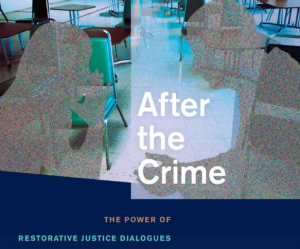 Susan Miller, professor of sociology and criminal justice at the University of Delaware, has received the Outstanding Book Award from the American Academy of Criminal Justice Sciences for her 2011 book, After the Crime: The Power of Restorative Justice Dialogues Between Victims and Violent Offenders.
Susan Miller, professor of sociology and criminal justice at the University of Delaware, has received the Outstanding Book Award from the American Academy of Criminal Justice Sciences for her 2011 book, After the Crime: The Power of Restorative Justice Dialogues Between Victims and Violent Offenders.
Martin Wright reviewed the book last summer at Restorative Justice Online writing:
"Violence, rape, murder and other abusive crimes: not usually pleasant subjects to read about, yet Susan Miller's book left this reader with a positive feeling. This is largely due to Miller herself, who presents the information in a straightforward, sympathetic but non-judgemental way ..."
Read the rest of that review here.
Find the book at Amazon.com, where you can also look inside to take a peek at some sections. It is also available directly from the publisher NYU Press in paperback.
